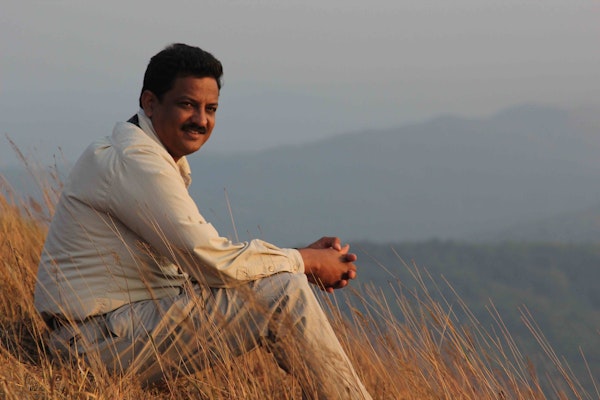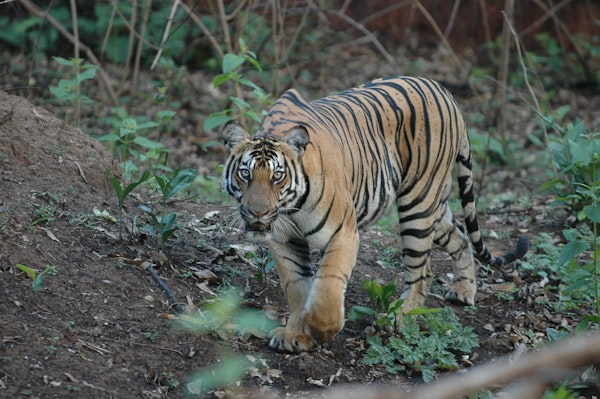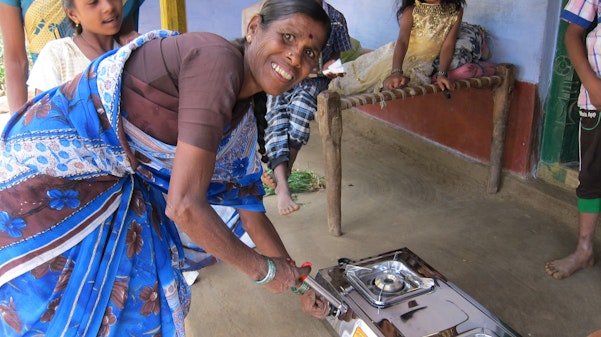Winner of the Whitley Award donated by WWF-UK
emerging leader
Sanjay saw his first tiger 30 years ago and was instantly captivated. Compelled to pursue his passion, he left his job as an electrical engineer and began working in conservation. Today he is spearheading efforts in Karnataka State, home to 20% of India’s Bengal tigers. A scientist at the Nature Conservation Foundation, Sanjay collaborates with authorities and stakeholders to protect and connect tiger habitats. Working closely with the government, in 2012, Sanjay helped legally secure 2,385 km² of tiger habitat. This represented the largest expansion of protected areas in India since 1970, enhancing connectivity across 23 sites.

tiger corridors
With his Whitley Award, Sanjay is working to reduce forest degradation in two important wildlife sanctuaries which connect multiple protected areas, forming one of the largest contiguous tiger habitats in the country. The area has the potential to support more than 100 tigers and acts as a corridor, allowing individuals to move between territories to prevent inbreeding. Its conservation will also benefit other wildlife including elephants, leopards, pangolins and honey badgers.

reducing pressure
People are central to Sanjay’s approach. Local communities rely on firewood from the forest as fuel for domestic cooking. Through the provision of alternatives to firewood, Sanjay will strengthen protection of these corridors eliminating the need, risk and hardship incurred by people who extract firewood. The introduction of stoves that use alternative energy will reduce indoor air pollution, benefiting the health of women and families. Sanjay will also speed up compensation payments to farmers whose livestock have been lost to tiger and leopard attacks, helping tackle human-carnivore conflict and boosting support of conservation from those living alongside wildlife.

Sanjay’s project will:
- Scale up distribution of forest-friendly stoves to decrease pressure on tiger corridors and benefit over 1,000 families
- Empower young people through skill development and training to help them become employed in professions that are not reliant on forest resources
- Mobilise support for conservation through outreach campaigns
- Enable people affected by livestock and crop depredation to access government support
Why it matters:
- There are fewer than 4,000 wild tigers worldwide with approx. 50% living in India
- Over 100,000 people depend on protected areas for their daily needs and livelihoods where Sanjay works
- Using alternative energy stoves will reduce smoke inhalation – a major cause of respiratory disease
“Conservation is an art of the possible: with collective efforts and not being afraid to try, we can succeed.”
PROJECT UPDATE
2024 CONTINUATION FUNDING
A Pathway to Recovery: Alternatives to Firewood to Conserve Tiger and Elephant Habitats
India
£70,000 over 2 years
India is home to the world’s largest population of wild tigers and Asian elephants, with Karnataka’s Malai Mahadeshwara (MM) Hills-Cauvery landscape playing a vital role in their long-term survival. However, habitat loss, degradation, and poaching remain significant threats, with firewood collection emerging as a key driver of habitat degradation. The firewood harvested by communities are also key fodder species for elephants and tiger prey such as sambar, axis deer and other wildlife species. Thanks to the continued efforts of Sanjay Gubbi and his team at Holématthi Nature Foundation (HNF), a sustainable solution is helping both people and wildlife thrive.
Since receiving his Whitley Award in 2017, Sanjay has led groundbreaking interventions to reduce firewood dependence by distributing LPG cookstoves to nearly 2,500 households—far exceeding initial targets. This initiative has decreased firewood usage by approximately 65%, reducing habitat destruction and lowering carbon emissions by 110 tonnes annually. In addition, women who previously spent 800 hours a year collecting firewood have been able to reclaim their time for education, income generation, and family well-being, while experiencing significant health improvements due to reduced smoke exposure.
With Continuation Funding, Sanjay is now expanding his work to address the lack of sustainable heating alternatives for bathing and daily needs,. His team will provide fuel-efficient water heaters to 450 households across the MM Hills-Cauvery landscape, further reducing firewood dependency by an additional 30-40%. This will ensure that the firewood dependency of families on the MM Hills-Cauvery landscape will be almost halted.
Sanjay’s conservation strategy extends beyond direct interventions. By working closely with local communities and the government, he is enhancing habitat protection and bolstering conservation efforts. His team will conduct ecological monitoring to assess tiger, prey, and elephant populations, ensuring that conservation actions lead to measurable improvements. The Holématthi Nature Information Centre, a unique nature education school that focuses on students and local communities has been successfully running since the last six years.
This integrated approach is already showing remarkable results. Crop losses of beneficiary families due to human-wildlife conflict have reduced by 80%, while alternative livelihood projects have empowered local families to become self-sustaining. Through these efforts, community attitudes towards conservation continue to shift positively, leading to increased protection for some of India’s most iconic wildlife.



